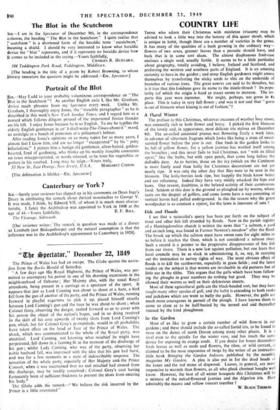Fish and Floods
I see that a naturalist's query has been put forth on the subject of trout and other fish left stranded by floods. Now in the parish register of a Huntingdonshire church is written the news that " a salmon, a yard and an inch long, was found in Farmer Newton's meadow" after the flood. The brook up which the salmon must have swum runs for eight miles or so before it reaches the Ouse, which is not considered a salmon river. Such a record is a pointer to the progressive disappearance of fine fish from our rivers. There is a new law against pollution, but one fears that local councils may be as slack in administering it, as, say, in carrying out the instruction to survey rights of way. The most obvious effect of floods is to kill the earthworms, especially in grass fields ; and the latest verdict on the subject is that worms are invaluable in old pastures but of little use in the tilths. This argues that the gulls which have been follow- ing the ploughs in great numbers do nothing but good. They may be allowed their worms as well as their deleterious insects.
Most of these agricultural gulls are the black-headed sort, but they have taught many other species of gull, and the habit is extending to both rooks and jackdaws which are wont to bully the gulls. However, the gulls are much more courageous in pursuit of the plough. I have known them to come so close as to be half-buried by the turned sod and thereafter rescued by the kind ploughman.


































 Previous page
Previous page